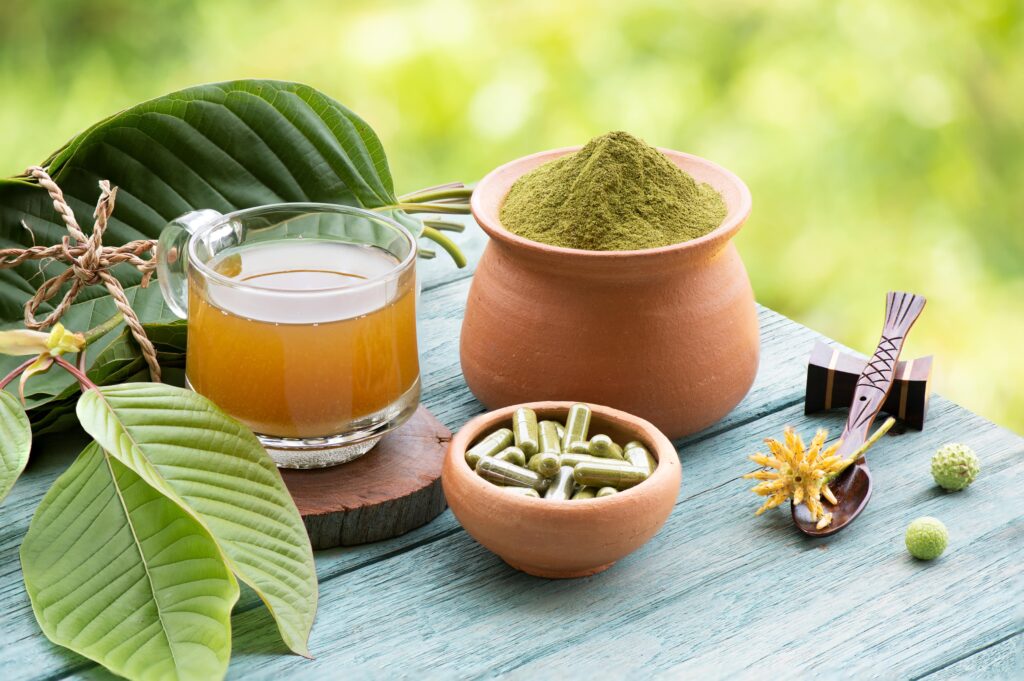
Kratom Withdrawal
Don’t believe the myth that kratom is safe and non-addictive. Using this drug can put you in grave danger – and if you develop an addiction, the intensity of kratom withdrawal can make it extremely difficult for you to stop using it.
What is Kratom?
Kratom is the name of a tree that grows in Cambodia, Thailand, Myanmar, and other Southeast Asian countries. It is also the name of a drug that is derived from the leaves of this tree. The primary psychoactive compounds in kratom are mitragynine and 7-hydroxymitragynine.

Traditionally, laborers in areas where kratom is indigenous have chewed the leaves as a means of remaining alert and warding off exhaustion. The drug can also be ingested by swallowing it in pill or capsule form, smoking it, or drinking it in teas or cold beverages.
In addition to its stimulant-like properties, kratom can also elicit effects such as sedation and analgesia (pain relief), which are similar to what opioids produce. This has enticed some people to use it as a painkiller or for recreational purposes, and prompted others to take it to ease the effects of opioid withdrawal.
Many reputable sources advise against kratom use for any reason due to the risk of addiction, other dangerous side effects, and the potential distress of kratom withdrawal.
Some American soldiers used kratom during the Vietnam War. However, the drug did not become popular in the United States and other western nations until the early 2000s. In 2021, the Substance Abuse and Mental Health Services Administration (SAMHSA) reported that about 1.7 people ages 12 and older in the U.S. had used kratom at least once in the previous 12 months.
Kratom’s legal status in the U.S. can be confusing.
It has not been approved by the Food and Drug Administration (FDA), but it has also not been banned by the Drug Enforcement Agency (DEA). Several states have outlawed kratom or placed restrictions on its sale, possession, and use, yet it continues to be sold openly in many stores and as well as online.
The Painful Side of Kratom Withdrawal
The lack of a federal ban and the relative ease with which kratom can be obtained may have contributed to a belief that it is a harmless substance. This is not the case. People who use the drug, either recreationally or for self-medication, may be exposing themselves to considerable harm.
The potential dangers of kratom use include liver damage, hypertension (high blood pressure), depressed respiration, and seizure. Kratom use can also lead to addiction, overdose, and death.
Kratom Withdrawal Symptoms
When someone becomes addicted to kratom, they may have to endure intense withdrawal symptoms.
The type and severity of a person’s withdrawal symptoms can be influenced by several factors. These include their weight and metabolism, how long they have been using kratom, and how much they typically use.
With those caveats in mind, common kratom withdrawal symptoms can include:
- Runny nose and watery eyes
- Blurred vision
- Elevated body temperature
- Heavy perspiration
- Loss of appetite
- Abdominal cramping
- Nausea, vomiting, and diarrhea
- Tics and twitches
- Muscle spasms
- Muscle pain
- Insomnia
Kratom withdrawal can also include various forms of psychological distress, such as:
- Powerful drug cravings
- Drastic mood swings
- Agitation and irritability
- Anxiety
- Depression
- Suicidal ideation
How to Safely Withdrawal from Kratom
The intensity of kratom withdrawal – and the knowledge that you can alleviate this pain simply by using the drug again – can quickly overwhelm even the most fervent desire to stop using it. The risk of suicidal ideation is another reason why trying to get through withdrawal on your own can be a very bad idea.
If you’re trying to end your kratom use after developing an addiction, there’s no way to avoid withdrawal. But there is a way to get through this experience safely and more comfortably.
Detoxification, or detox, is a short-term, professionally supervised program that can help you complete the kratom withdrawal process without endangering your health or exposing you to avoidable distress.
Here are a few of the many benefits of beginning your treatment in a detox program:
- Environment: While you’re in detox, you won’t have access to kratom or other addictive substances. This removes the temptation to use the drug to stop your withdrawal symptoms.
- Expertise: The professionals who provide your care in detox will be familiar with all aspects of the withdrawal process. This can eliminate fear of the unknown. It can also provide you with the peace of mind that your team is prepared for whatever contingencies may occur.
- Clinical services: While you’re in detox, you may receive medical and/or therapeutic support to ease your pain and help you manage your remaining symptoms.
- Continuity of care: Once you’ve completed detox, you can transition directly into an inpatient or outpatient program, where you can establish a solid foothold in early recovery.
- Sense of success: Getting through kratom withdrawal can be a significant step toward a much healthier future. It can also be proof that you are capable of much more than you may have once believed. This knowledge can be a source of both strength and hope as you face future challenges on the path of lifelong recovery.
Contact Us to Detox from Kratom in Los Angeles, CA
Don’t let withdrawal prevent you from achieving the healthier, drug-free future that you deserve.
Sanctuary Treatment Center offers a full continuum of customized addiction treatment services, including detox, inpatient care, and outpatient programming. Our compassionate experts can help you get through withdrawal, then develop the skills that will support your successful, long-term recovery. We will work closely with you to understand the full scope of your needs, identify your goals, and develop a personalized plan just for you.
To learn more or to schedule a free assessment, please visit our Contact page or call us today.


